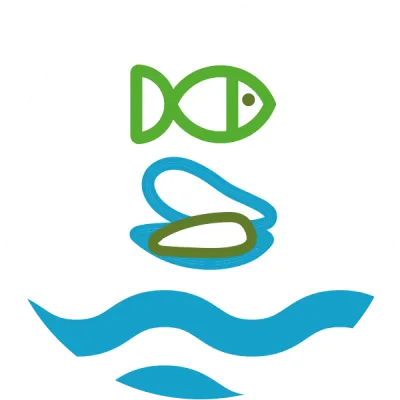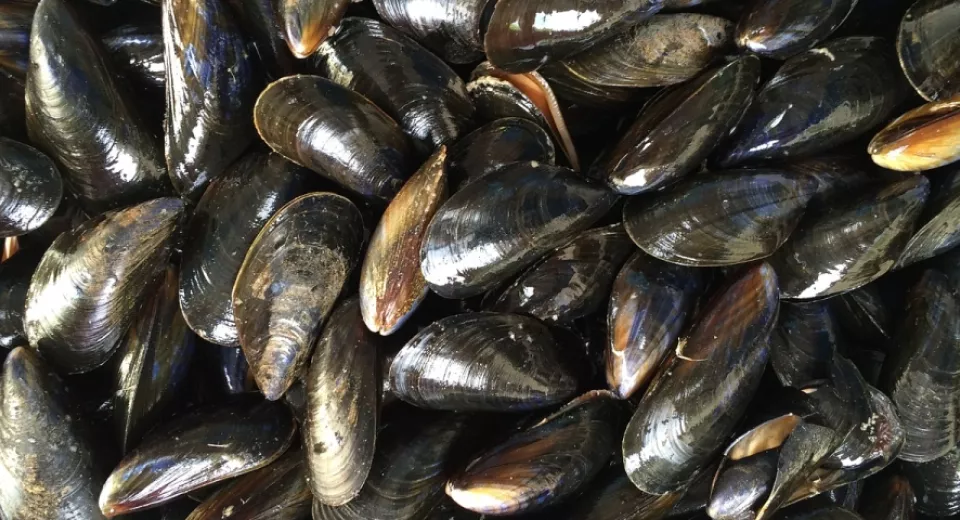Sustainable seafood & marine biotechnology

A successful marriage between sustainable food and sustainable energy
Sustainable and local: that is what we want on our plate nowadays. Our unique location by the North Sea provides good opportunities in this respect. By providing support, Blue Cluster has helped realise various projects that focus on sustainable marine food production, including the combination of aquaculture and fishing on the same offshore location and the cultivation of mussels on ropes at wind farms.
As the world’s population is growing, the demand for food products from the oceans and seas is also increasing. The North Sea is no exception to this rising pressure. Sustainable fisheries and aquaculture are a must to ensure sufficient supply in a responsible manner and without a severe environmental impact. In addition, they contribute to the biodiversity of the North Sea: new aquaculture applications create new habitats for other marine species.
Mussel farming combined with wind energy
The foundations of offshore wind turbines are colonised by little organisms, which in turn attract larger organisms. To maximise this process, designs are drawn up to build new generations of ‘nature-inclusive’ wind farms with fish hotels and erosion protection around the foundations.
In addition, tests have been carried out as to mussel farming between the wind turbines, and algaculture experiments have been conducted. This way, the return per square kilometre of North Sea can be maximised.

Flanders is already a pioneer in offshore wind energy and occupies fourth place worldwide in energy production at sea. By linking this to sustainable aquaculture, the Flemish region is going one step further, and we are further unlocking the potential of the sea: we are producing not just renewable energy from the wind, waves, tides and sun, but also food.
Since the mussels are farmed offshore on ropes, they grow more quickly than seabed cultured mussels and have a particularly high meat content. The end result is a unique Belgian mussel. As the shells end up on the seabed, a new benthic community can develop as well.
It is also interesting to note that the growth will no longer have to be monitored on site. Smart applications and underwater drones will enable us to gather a great deal of information remotely in the future. It will thus no longer be required to go out to sea, sometimes under adverse weather conditions, to find out when the mussels need to be transplanted and harvested. Especially in winter, it is nearly impossible to check up on the mussels in manned vessels.
Passive fishing
Another innovative project concerning sustainable food is the SYMAPA project, managed by Blue Cluster. This project is based on the know-how gained from the offshore pilot project Value@Sea: the development of cultivation systems for mussels, oysters, seaweed and scallops on the same site in so-called ‘sea farms’ – offshore aquaculture. On such ‘farms’, the organisms are indirectly fed with nitrogen and phosphorus flowing from our rivers into the sea.

SYMAPA (Synergy between Mariculture & Passive Fisheries) investigates what materials can enrich these habitats and how North Sea-proof, safe and predictive production and harvesting systems can be developed. However, the focus of SYMAPA is primarily on passive fishing, which uses techniques that do not disturb the seabed.
Since the preliminary results have been positive, a first application has been made for a commercial sea farm. In this regard, SYMAPA also fits in perfectly with the new marine spatial plan of the Belgian federal government, which states that innovative and sustainable projects may be launched offshore within small and clearly demarcated zones where the impact will be minor.
Nature conservation
The above-mentioned biodiverse infrastructures offer a wide range of benefits. First and foremost, they ensure that the pressure on our fishing grounds does not become too great. In addition, the cultivation installations are a potential food source and shelter for other sealife (fish, lobsters and crabs). This way, healthy seafood can be farmed that fits in perfectly with the philosophy of locally produced, home-grown food.
Finally, innovative offshore aquaculture techniques can be used as nature-based coastal defence solutions. To this end, the Coastbusters project was set up. This demonstrates that the effects of sustainable food projects can go beyond their objectives, and can even have a positive impact on the water quality, biodiversity and nature conservation in and around the North Sea.